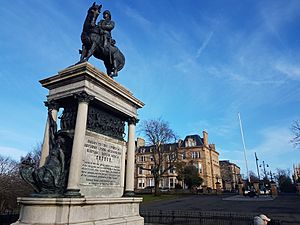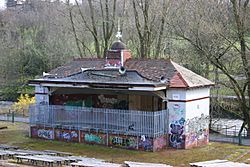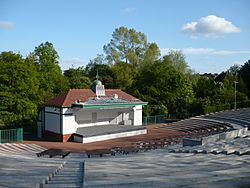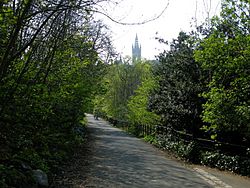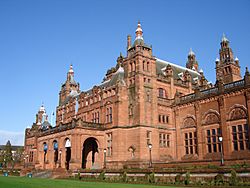Kelvingrove Park facts for kids
Quick facts for kids Kelvingrove Park |
|
|---|---|
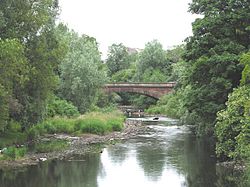
The River Kelvin passing through the park
|
|
| Type | Public park |
| Location | Glasgow, Scotland |
| Area | 34 hectares (85 acres) |
| Created | 1852 |
| Operated by | Glasgow City Council |
| Status | Open all year |
| Public transit access | Kelvinbridge subway station |
Kelvingrove Park is a large public park in Glasgow, Scotland. It's located right on the River Kelvin in the city's West End. The famous Kelvingrove Art Gallery and Museum is also found here. It's a great place for people to relax, play, and enjoy nature.
Contents
History of the Park
Kelvingrove Park first opened in 1852. Back then, it was called the West End Park. Part of its design came from Sir Joseph Paxton, a famous gardener. He also helped design The Crystal Palace in London! But most of the park was designed by architect Charles Wilson.
The city bought the land for a lot of money, about £10.9 million in today's money. The park was made for Glasgow's growing population. It gave people a nice place to relax and escape the busy city.
Past Exhibitions
Kelvingrove Park has hosted three big events called International Exhibitions. These were held in 1888, 1901, and 1911. For these events, huge and impressive buildings were built in the park. Imagine a large Indian-style building or a Russian restaurant! However, these buildings were later taken down.
Some fountains that were part of these exhibitions were moved. The Doulton Fountain, from the 1888 event, is now in Glasgow Green. The Saracen Fountain, from 1901, is in Alexandra Park.
Park Location and Features
The park is quite big, covering 34 hectares (about 85 acres). It's in the West End of Glasgow. The River Kelvin flows right through it before joining the Clyde. This makes the park a wonderful home for many animals.
You might spot birds like grey herons, cormorants, and kingfishers. Other animals like red foxes and even otters live here!
The park is surrounded by different parts of Glasgow. The University of Glasgow is to the west. This central spot makes it a popular path for people walking or cycling to the city centre. It's also a favourite place for dog-walkers and students.
The park is built around a big hill. On this hill is the Park District. This area used to be a very fancy place to live. Now, it has many offices and student homes. But new buildings are bringing more families back to live there.
There are three subway stations close to the park. Kelvinbridge is the closest. Hillhead and Kelvinhall are also nearby. You can also find train stations and bus stops close to the park.
Monuments in the Park
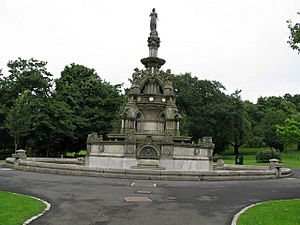
Kelvingrove Park has a bandstand, a skatepark, and areas for bowling and croquet. You'll also find many statues and monuments. The biggest one is the Stewart Memorial Fountain. It was built in 1872 to remember Robert Stewart. He was a city leader who helped bring fresh water to Glasgow from Loch Katrine.
The fountain is made of granite, sandstone, marble, and bronze. It shows scenes from the Scottish countryside. A statue of the "Lady of the Lake" from a famous poem sits on top. This beautiful fountain is currently being fixed up.
The park also has statues of important people. These include scientist Lord Kelvin and writer Thomas Carlyle. There are also memorials for soldiers, like the Cameronians War Memorial. The park is next to the Kelvin Hall Sports Arena.
The Bandstand
The park's bandstand was built in 1924. It was a very popular place for outdoor music for many years. Bands played all sorts of music there, from military tunes to rock concerts. It was also used for charity events.
Sadly, the bandstand became damaged and neglected around 1995. Many Scottish bands and musicians wanted it to be fixed. In 2012, money was given to repair it. After £2 million of work, it reopened in 2014! Now, it hosts summer music festivals again.
Flora in the Park
On April 20, 1918, a special tree was planted in the park. It was a sessile oak, now known as the Suffrage Oak. This tree was planted to celebrate women getting the right to vote that year.
In 2015, this tree was named Scottish Tree of the Year. It was even nominated for European Tree of the Year! The tree was damaged in 2017, so its height had to be reduced.
Kelvingrove Park in Culture
- The famous Scottish football club Rangers was started by four friends who met in the park in March 1872.
- The Kelvingrove Lawn Bowls Centre in the park hosted the lawn bowls event for the 2014 Commonwealth Games.
- A poet named Lyle wrote a song about the park called Kelvin Grove.
- Parts of Alasdair Gray's book Poor Things happen in and around the park.
- A suburb in Brisbane, Australia, called Kelvin Grove, was named after this park.
- The park also appears in Louise Welsh's book, The Cutting Room.
- OUTrun, a 5-mile race, takes place in the park every August.
- The park is shown a lot in the Bill Forsyth film That Sinking Feeling.
- The Scottish band The Bathers released an album called Kelvingrove Baby in 1997.
Gallery
- Kelvingrove Park
-
The River Kelvin is to the right, with Glasgow University tower in the distance.
 | Aaron Henry |
 | T. R. M. Howard |
 | Jesse Jackson |


